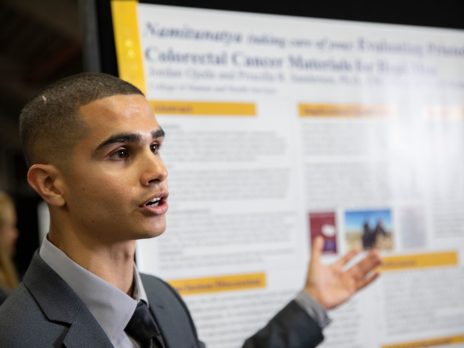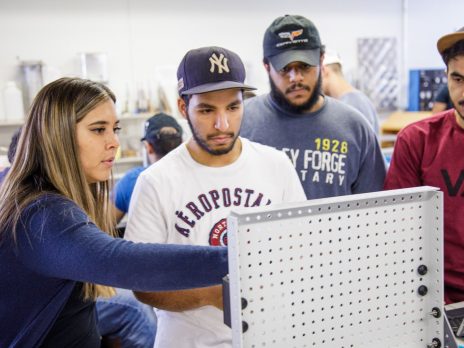Cybersecurity at NAU
Summary
The focus in cybersecurity at NAU is a multidisciplinary effort and is a part of the department of Applied Physics and Material Science as well as the School of Informatics, Computing, and Cyber Systems (SICCS) within the College of Engineering Informatics, and Applied Sciences. Approximately $10M in research funds were secured from NAU, Arizona Board of Regent, the National Science Foundation, the US Army, the Navy, and Industry. About 24 students are involved in the cybersecurity team, including 16 PhD students. In the last four years, the team published 39 papers and 49 invention disclosures. Three graduate classes are offered: INF638, “Elements of Cryptography”; INF639, “The Use of Nanotechnologies for Cybersecurity”; PHY599,”Quantum and Post Quantum Cryptography” .
Our University Partners Accordion Closed
- Michael Gowanlock
Dr. Gowanlock’s research interests include applying high performance and parallel computing to cybersecurity problems, such as response-based cryptography to secure IoT devices, and optimizing post-quantum cryptography algorithms to exploit emerging parallel architectures. - Bahattin Yildiz
Associate Professor Department of Mathematics and Statistics - Tuy Nguyen
Cryptography, Homomorphic Encryption, Hardware Security, System-on-Chip Design - Truong Nghiem
Cyber-Physical Systems (CPS), machine learning and control, autonomous systems.
$10M
Research Funds56
Published Papers49
Invention DisclosuresResearch Programs
The areas of research at NAU in cybersecurity include the use of nanotechnologies to offer higher levels of cybersecurity and novel cryptographic protocols based on ternary computing: public key infrastructures, digital signatures for blockchains, post quantum cryptographic schemes, quantum key distribution, use of high performance computing (HPC), password managers, and keyless encrypting devices. The active research programs are:
- Research programs funded by the Army Research Lab (ARL): “Methods to encrypt and authenticate digital files in distributed networks and zero-trust environments ”
- Research effort funded by CipherLoc: “Use of Physically Unclonable Functions (PUFs) for Polymorphic Cryptography“
- Research effort funded by BRIDG: “Development of Low Power Memristors”
- Research effort funded by NSF’s: “Power Effective Error Correcting Methods for ReRAM-based PUFs”
- From 2016 to 2019, a multi-university grant (NAU-ASU-UA) funded by Arizona Board of Regents: “Nanotechnologies for Cybersecurity”
- Leveraging the start up funds approved by the President of the university from 2016 to 2020, other active areas of research include: “Noise Induced Cryptography with High Performance Computing”, “Securing Digital Signature for Blockchain Technologies”, and “The Use of Ternary Computing for Quantum Key Distribution, Polymorphic Encryption”.
A major project was approved by both the US Air Force and the Navy ($5.4M) to fund the following projects from 2019 to 2022:
- “Unequally Powered Cryptography with High Performance Computing”
- “Hash-based Cryptography with PUFs”
- “Securing Quantum Key Distribution”
- “Keyless Encrypting Devices with Memristors”
- “Ternary Addressable Public Key Infrastructures”
- “Architectures for Computing Diversity”
- “Radiation Effects on Memristor-based PUFs”
Securing Blockchain
Research News
AFRL partners with Northern Arizona University, DOD labs, industry to develop nanotechnology solutions to cyberattacks and cyber warfare
Cambou, a professor of nanotechnology and cybersecurity in the School of Informatics, Computing, and Cyber Systems (SICCS), is the principal investigator on a grant from the U.S. Air Force to develop nanotechnology solutions to cyberattacks and cyber warfare. SICCS professor Paul Flikkema is the PI on a grant aimed at developing hardware for computer diversity. Together, the grants total $6.3 million and include a dozen researchers and students at NAU. Read More.
Cybersecurity team at NAU testing ternary computing to secure blockchain technology for cryptocurrency and other applications
A team of cybersecurity researchers from NAU’s School of Informatics, Computing and Cyber Systems, led by professor of practice Bertrand Cambou, was recently awarded a $125,000 grant by the U.S. Air Force Research Lab (AFRL) to study how to apply NAU’s technology to secure the blockchain with novel digital signature schemes. Read More.
NAU electrical engineers to lead development, commercialization of next-gen cybersecurity solutions for Internet of Things
A team of electrical engineers, led by assistant professor and principal investigator Fatemeh Afghah of Northern Arizona University’s School of Informatics, Computing, and Cyber Systems (SICCS), was recently awarded a $750,000 grant by the National Science Foundation’s Partnerships for Innovation Program to develop and commercialize a next-generation cryptosystem, or security platform, capable of protecting IoT devices from cybersecurity attacks through more advanced authentication procedures. The NAU team, which includes professor of practice Bertrand Cambou and assistant professor Abolfazl Razi, will collaborate with Michael Kozicki and Hugh Barnaby of Arizona State University to enhance security solutions used in e-commerce, banking, smart cities, supply chains, smart health, machine-to-machine communications and the IoT. Read More.
NAU cybersecurity expert elected senior member of the National Academy of Inventors
The National Academy of Inventors (NAI) has named Northern Arizona University professor of practice Bertrand Cambou one of 66 academic inventors to the inaugural class of NAI senior members. NAI is a member organization comprised of U.S. and international universities as well as governmental and nonprofit research institutes, with more than 4,000 members spanning more than 250 institutions worldwide. Read More.


